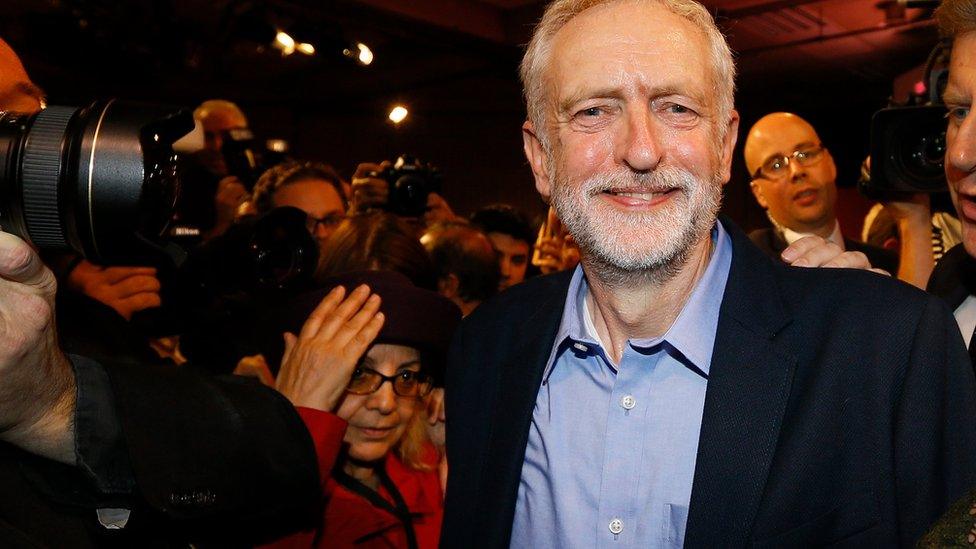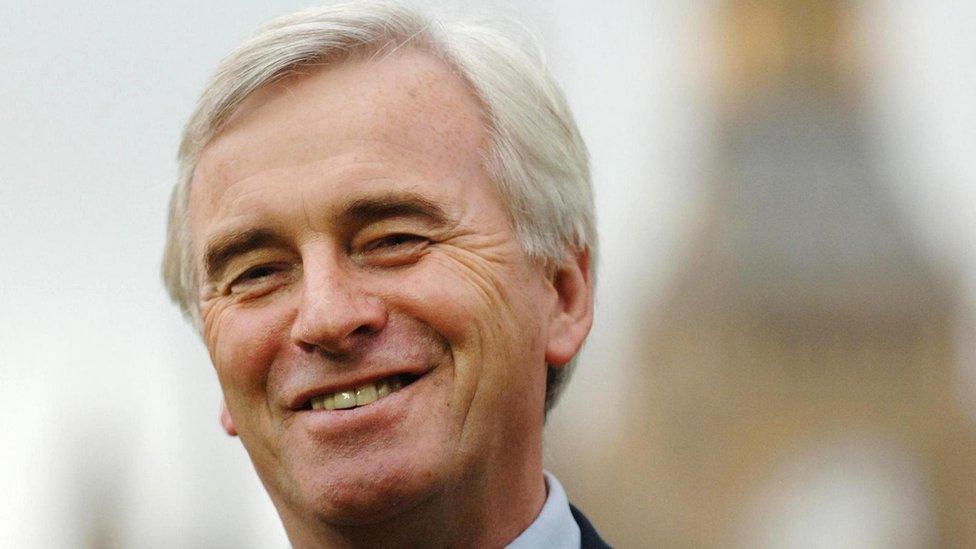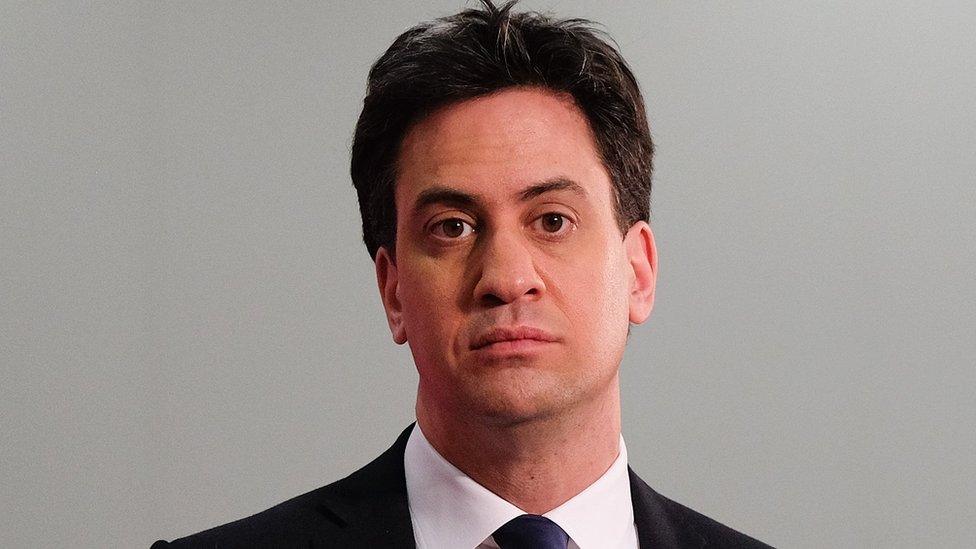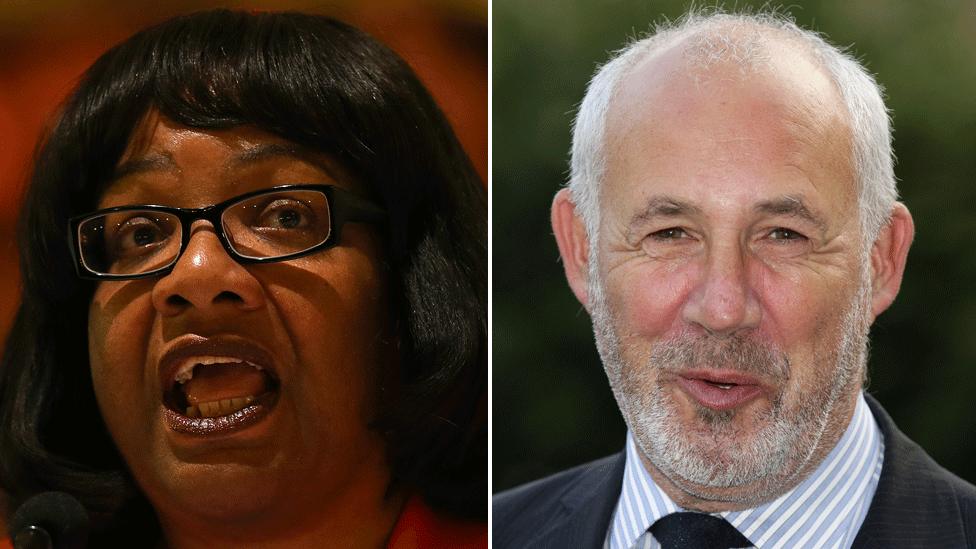Who are Jeremy Corbyn's main allies in the Labour Party?
- Published

Jeremy Corbyn wasn't the left's first choice for Labour leader.
Jon Trickett, who had been close to Ed Miliband, declined to stand and Diane Abbott, who came last in her previous attempt, was concentrating on her bid to become Labour's candidate for London Mayor.
Twice, in 2007 and 2010, John McDonnell tried to get on the ballot to lead his party. Twice he failed to garner enough support from his fellow Labour MPs. He has had a heart attack since - and didn't feel like a third attempt.
But Mr McDonnell was a lynchpin of the Corbyn campaign - the "agent" that helped persuade 36 MPs, just one more than the minimum necessary to get on the ballot, to support the Islington North MP. Remarkably, this included 14 who "lent" him their backing in order to broaden the debate.

John McDonnell will be an important part of Team Corbyn
Mr McDonnell will be hugely influential.
He is the chair of the Socialist Campaign Group. He was elected for Hayes and Harlington in 1997 when Tony Blair swept to power but in many ways he formed - with Jeremy Corbyn - an unofficial opposition. He voted against many things which defined the Blair era. He opposed the Iraq war, foundation hospitals, and top-up tuition fees.
He had represented the same area of west London on the Greater London Council between 1981 and its abolition by Mrs Thatcher's government five years later, serving as deputy leader to Ken Livingstone. He championed causes which were dubbed "loony left" by opponents at the time - from support for women's sections within the Labour Party to campaigning for a united Ireland. He would argue when it came to positive discrimination, and a peace process in Northern Ireland, he was ahead of the curve.
He - unlike some on the left - has widespread experience of running things. He was chief executive of the Association of London Authorities and its successor body, the Association of London Government.
A former colleague once said life at the ALG was a bit like in medieval times - "nasty, brutish and short." Mr McDonnell is certainly more personally pugnacious than the new Labour leader but is not without charm and certainly not without intelligence.


When Jon Cruddas - Labour's former policy chief - suggested swing voters had abandoned the party because it wasn't trusted on the economy, he posted this on his website:
"First, it is unarguable that no modern party leader can win an election if behind in the polls on economic competence. Ed Miliband, sadly, was proof of this truism. Second, deficit denial is a non-starter for anyone to have any economic credibility with the electorate. This was a key finding of the poll recently published by Jon Cruddas, examining why Labour lost the election.
"So let me make it absolutely clear that Labour under Jeremy Corbyn is committed to eliminating the deficit and creating an economy in which we live within our means. Where the Corbyn campaign parts company with the dominant economic thinking of both the Conservative government and the other Labour leadership candidates is that we don't believe that the vast majority of middle and low-income earners who didn't cause the economic crisis should have to pay for it."
Some on Labour's left have suggested Mr McDonnell would be an excellent shadow chancellor.

Ed Miliband aide on his leadership: "You should always believe cock up not conspiracy theories"
Like Jeremy Corbyn, Mr McDonnell has experience of working with wider movements outside the Labour Party - including the People's Assembly against Austerity, an umbrella group which also encompasses activists from the Greens, and parties to the left of Labour.
Another member of the Ken Livingstone coterie - though more recently - was a huge asset to Corbyn's campaign. Simon Fletcher was Mr Livingstone's resourceful chief of staff when he was London Mayor, during his first term of office in 2000.
Mr Livingstone had failed to win the Labour nomination and stood as an independent in 2000 against the official party candidate, Frank Dobson.
Mr Fletcher helped mastermind the victory but also negotiated an early "re-entry" for his boss back in to Labour before the 2004 election.
In 2013 he was appointed as Ed Miliband's trade union liaison officer - to heal wounds after the Falkirk fiasco. Unite's choice of candidate, Karie Murphy, had been cast aside amid controversy and accusations of vote-rigging. She was later cleared of wrongdoing but not before Tom Watson, who employed her in his office - and now the new Labour deputy leader - resigned over the handling of the affair.
Mr Watson himself will be instrumental in holding the party together and will push for Mr Corbyn to become "inclusive", but will also encourage those to Mr Corbyn's right to co-operate with the new regime.

Diane Abbott and Jon Trickett have been high-profile supporters of Jeremy Corbyn and are stalwarts of the Labour left
Mr Fletcher helped draw up the new rules under which Mr Corbyn was elected - including giving votes to "supporters" who could join at a cut price rate. He was certainly close to activists in the Trotskyite Socialist Action movement in the past but those who worked with him under Ed Miliband said he wasn't factional. They also point out the main movers behind the new rules were on the party's right, not left, as they assumed the power of the unions would decrease as a result.
One of Mr Miliband's aides told me privately "you should always believe cock up not conspiracy theories if you are thinking about our time in office".
'Ideologically compatible'
Labour peer Toby Harris served on the London Assembly when Simon Fletcher worked with Mr Livingstone and he chaired the Association of London Government when Mr McDonnell was its chief executive.
"Jeremy is nice enough but not very organised. Both of them are organised and effective. Simon Fletcher is very bright and able; he has a political ideology but he tends to think what's the best way of making things happen. John McDonnell was very effective and very competent."
He said they are both "ideologically compatible" with the new leader but both hopes and expects that they won't launch battle against sitting MPs - the like of which was last seen in the 80s.
"The Corbyn leadership has said it won't drive people out of the party - certainly to go back thirty years in three months would be very bad for Labour so it's important we do try to pull together."

A former member of Mr Corbyn's office staff and now an MP, Cat Smith is likely to be an important ally
But with leading figures on the front bench refusing to serve - including the former leadership candidates Yvette Cooper and Liz Kendall, as well as Rachel Reeves, Tristram Hunt and Chris Leslie - the new leader may give newer and younger MPs the opportunity to join the front bench, at least in a junior capacity.
Early backers included the former BBC reporter Clive Lewis, who won Norwich South at the general election. He's also an army reservist. So like Mr Corbyn, he is not a typical politician. But while the new Labour leader set up the Stop the War coalition to protest initially against the intervention in Afghanistan, Lewis served with the troops there in 2009.
Mr Lewis's friends say he is not sure if he is ready yet for the front bench, but another new MP, the former trade union lawyer Richard Burgon, was an early supporter and could be a valuable addition to Mr Corbyn's team.
Challenge ahead
For the past five years the two Eds - Miliband and Balls - dominated Labour in parliament.
Now two "Cats" will be influential in the new leadership - Cat Smith, who used to work in Mr Corbyn's office and who is now MP for Lancaster and Fleetwood, and Islington councillor Kat Fletcher - the London borough's deputy mayor - who co-ordinated the work of 16,000 volunteers in the Corbyn campaign.
The colourful Carmel Nolan - a veteran, if that's the right word, of Stop the War and a former radio producer - had the unenviable task of handling the growing press interest in the person who was until recently an unfashionable 66-year-old backbencher.
She likened her experience to being "at the reins of a runaway horse."
Well, the campaign has certainly gone from a trot to a gallop - and with 60% of the vote, those who were predicting that Jeremy Corbyn will soon be for the knacker's yard are thinking again.
He has a loyal, if exhausted campaign team who have enthused many of Labour's new members - but now their challenge will be moving the party's policies more in line with the views of its leader, without splitting it apart.